 The Peep Tempel
The Peep TempelThe Peep Tempel’s frontman and songwriter Blake Scott takes Steve Bell on a stroll through the sleazy underbelly of society inhabiting their second long-player, Tales.
These days Aussie rock’n’roll doesn’t come much more dirty and debauched than the music of Melbourne trio The Peep Tempel. And it’s not just the raucous yet somehow groovy music – their twisted narratives are full of lowlife characters caught in seedy situations, and distinctly Australian in nature (although not in the way that fills you with national pride).
Starting out life as a duo utilising just guitar and drums, they soon found this format so restrictive that – having brought in a ringer to play bass on their eponymous 2012 debut album – they got bassist Stewart Rayner to join the ranks, and their new second long-player Tales is their first long-player with this settled line-up. It’s still dark and gritty and strange, but the ideas seem more fully-realised making it an excellent progression in both ambition and delivery.
“The main goal really was just to find a way to get it finished, I guess,” chuckles singer-songwriter Blake Scott, who founded the band back in 2009 with drummer Steven Carter. “It wasn’t that easy a process, which is of course a running theme with albums going from the first album to the second, plus this was the first one that Stuey the bass player played on. We just kept working and let the songs build themselves, and then we got to about ten or 11 songs and figured we were pretty close [to finishing], then we sat down and went, ‘Okay, now that we’ve got this far the last few [songs] that we’ve been writing are probably better’ and that changed the album’s course a little – we ditched a few, and that’s how we started heading in the direction of this record. We were looking to have a little bit more dynamic – we still have that live, loose feel to it, but the first album is pretty much red-lined all the way through in terms of pace and that sort of thing, so we just wanted to have a little bit more dynamic to this record and a little more space in the music.”
Most rock bands struggle to capture the intensity of their live show in the studio, but The Peep Tempel onstage are such a fearsome proposition that this normal quest must present its own challenges for the three-piece.
Don't miss a beat with our FREE daily newsletter
“There was a time when we thought that with this album we might change up the recording process a little bit and sort of do a multi-layered, multi-tracked recording, but it just wasn’t working for this band,” Scott recalls. “What we do is that we basically record and arrange the songs in our studio, get them to where we want them and then learn them, so by the time we’re going in there you sort of know what you’re doing pretty well – or as much as you can – because of course you’re not playing the songs for a really prolonged period of time.
“And when you’re recording there’s always that red button anxiety, so once you get going that anxiety’s there and you’re playing songs that are not in their embryonic stage perhaps but still quite young so there’s a bit of life in them. I think that’s how we do it. You’re never going to capture that same live energy I wouldn’t think, but then again you don’t even capture that between shows – each show is unique, and there are subtle differences in the feel to each show, I guess.”
As with acts such as Mclusky and Future Of The Left, The Peep Tempel are one of those rare heavy guitar bands that somehow make you want to dance amidst the maelstrom, and Scott explains that this status wasn’t achieved by chance.
“When we first started Steve and I were actually quite deliberately trying to write almost disco music,” he laughs. “It was, like, ‘Let’s write these punk songs and you put a disco beat on it!’ We thought we were the funniest people on earth, but even though it’s not the most original idea it seems to have stayed. We’re always trying to get people to move about, and do the foot-stomping – which doesn’t happen too much in Melbourne, they stand there with their arms folded – but around the rest of the place it seems to go down pretty well.”
Scott further explains that the change from their early duo form to the current trio incarnation – even though it happened a few years ago – is still changing their dynamic to this day.
“Yeah, it just got to a point where we couldn’t write anymore [for a two-piece] – we were getting bored with it ourselves,” he admits. “When we started out and were just having a bit of fun, we did a couple of shows and people were digging it and we actually made an album as a two-piece – there were about ten songs on it, five or six of which ended up being re-recorded for the [self-titled] album – but we were just finding to put it down on record without bass was just fucking boring. It was spineless and needed that kick, so it certainly changed the dynamic and a lot of the songs now actually come from someone coming up with a bass-line and us working from there.”
And those relentlessly squalid narratives with the cavalcades of sleazy characters?
“It’s all pretty seedy, I guess,” Scott chuckles. “To us you build a soundscape or a musical bed, and from that you build a character. The characters that are built for these songs are not meant to be anyone in particular – they’re just like a faceless character and an amalgamation of different experiences and different people. I guess some of it’s low-level crim and that sorta thing – I suppose in an Australian sense you can look at David Wenham’s character in [2003 crime flick] Gettin’ Square, there’s a lot of those sorta dudes in our songs. There’s a lot of parachute jacket-wearing guys.
“We try to keep a bit of humour without being derogatory or offensive, and that’s why there’s never any references to any actual person in any of the songs – we just build these characters that have something to do with this place called The Peep Tempel, which originally was a strip-club in Vienna which had the symbol of a naked lady with skulls and crossbones underneath it. I don’t even know what the fuck that means but it conjures up the image of some pretty seedy and likely characters, so we just wanted to have a bit if fun with the lyrics. A bit of a gag and some larrikinism.”
Furthermore Tales represents the third straight release on which colourful character Lester Moore has made an appearance (the first album featured Mister Lester Moore, the 2013 EP Modern Professional contained The Incarceration Of Lester Moore, and now we have The Opera Of Lester Moore) – was this recurrence planned from the get-go?
“Not really, it was there and we put it in for a bit of a lark,” Scott admits. “It’s becoming a rock opera and we don’t do rock operas. I remember when we were mixing the album I listened back to that song and had a bit of a moment and I turned to the guys and said, ‘Are we seriously fucking going to put this on? This is seriously fucking out there!’ I don’t know what to make of it myself so I don’t know what other people are going to think of it. I do actually like the fact that with Lester there’s always been this homo-erotic sort of vibe to everything he does and this one’s pretty off the wall, I think there’s a couple of characters on there which are a little bit too alpha male and they’re brought back down a peg or two by the nature of that song and Lester himself, I guess.”















